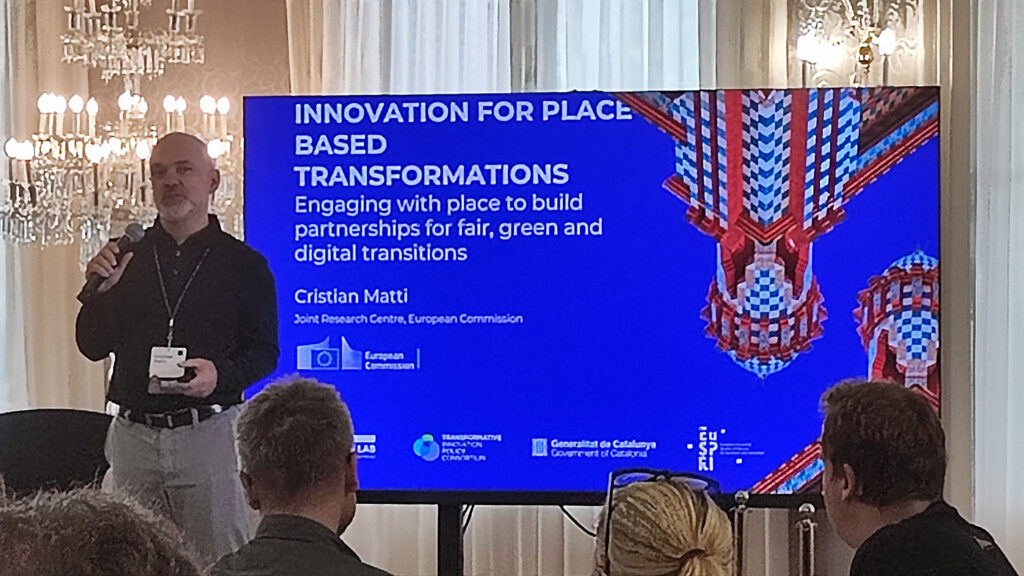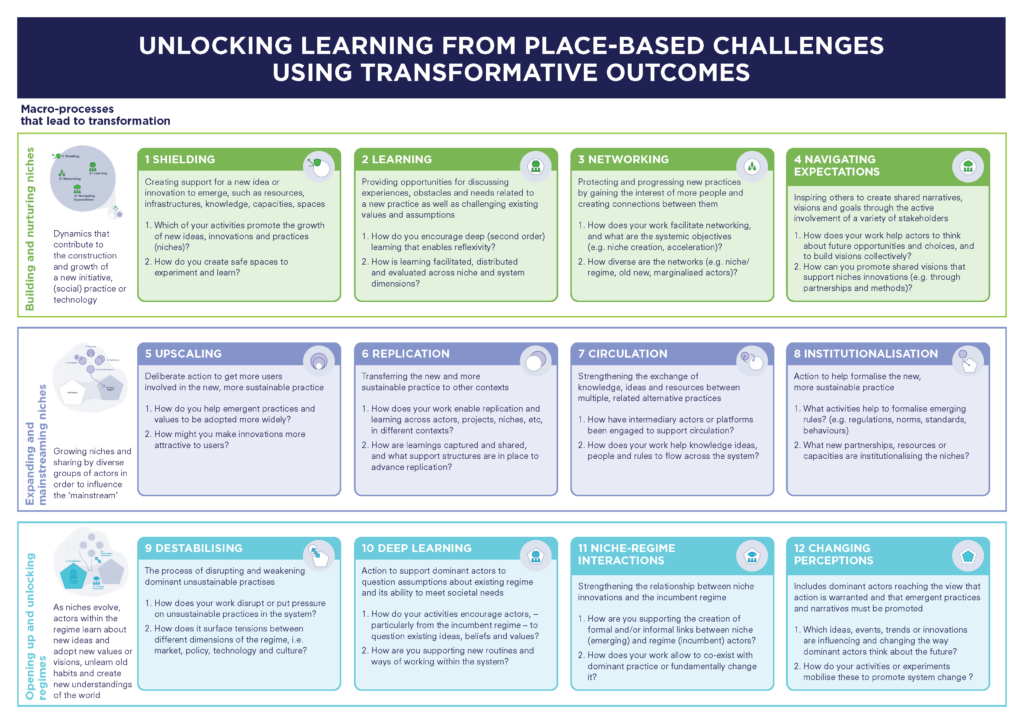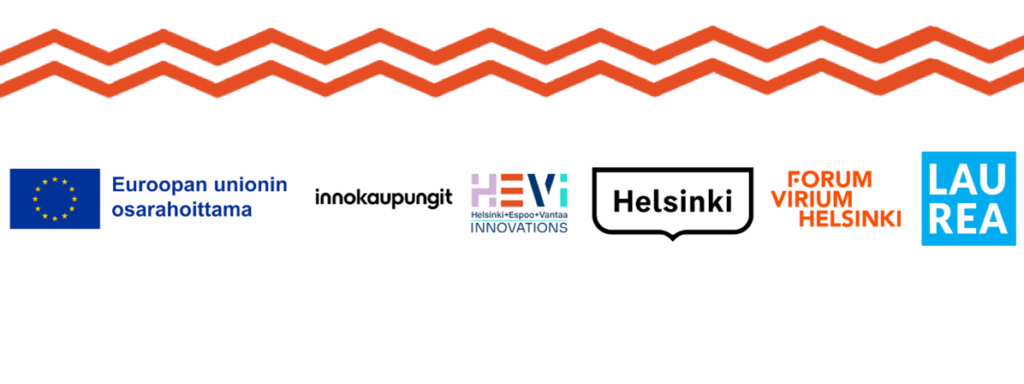How can transition theories be turned into practical tools for system change? At Engagement Week 2024 in Barcelona, global experts shared hands-on methods that can for example help scale experimentation in place-based approaches. This article explores transformative outcomes, one of the key tools introduced during the event and insights for ecosystem orchestrators and intermediaries in facilitating sustainable transitions.
 Photo: Mikael Seppälä/Laurea University of Applied Sciences
Photo: Mikael Seppälä/Laurea University of Applied Sciences
The writing process was supported by ChatGPT, which was utilized to produce a summary of the event memo and to check the accuracy of sources. All analysis, interpretation, and the final text remain under the author’s complete authority and sole responsibility.
Bridging Theory and Practice: Exploring Tools for Sustainable Transitions
The Engagement Week 2024: Scaling Experimentation – A catalyst for transformative system change event, organized by the Transformative Innovation Policy Consortium (TIPC) and the Deep Transitions Lab, provided an inspiring platform to explore how experimental approaches can be harnessed to tackle complex global challenges. Set against the historic backdrop of Barcelona’s Palau Reial de Pedralbes, a royal palace nestled in lush gardens, the event gathered experts to bridge theory and practice in the field of transformative system change—applying theoretical insights from transition studies to real-world, scalable practices.
Transition theory, a core theme of the event, examines how large-scale systemic changes happen over time, especially toward more sustainable futures (Schot & Steinmuller 2018). These transformations are often place-based, meaning they are grounded in specific local contexts, cultures, and economies (Bianchi et al. 2024). The event also emphasized the importance of transformative outcomes, which are targeted processes that help innovations take root and disrupt existing systems to drive sustainable change (Ghosh et al. 2019).
My invitation to the event came through my involvement with the TIP Resource Lab (https://tipresourcelab.net), an online platform that equips policymakers, researchers, and practitioners with methods from Transformative Innovation Policy (TIP) to foster systemic change. The TIP Resource Lab training for the network of coaches helped me gain insights into practical tools for change, which align with my work on ecosystem orchestration in two key projects: SERkut and KauKo.
The SERkut project (Sähkö- ja ElektroniikkalaiteRomut kiertoon uusilla toimintatavoilla, https://kiertoelektroniikka.fi), a collaborative initiative by Forum Virium Helsinki and Laurea University of Applied Sciences, focuses on advancing the circular economy for electrical and electronic equipment (EEE) in the Helsinki metropolitan area and Uusimaa. By fostering ecosystem collaboration, SERkut seeks to address urban electronic waste management challenges and promote circular electronics as a viable business model (Seppälä 2024). This initiative brings together stakeholders from various sectors—businesses, municipalities, policymakers—to create sustainable solutions for recycling and managing EEE lifecycles.
The KauKo project (Kaupunkiympäristöt Kokeilualustana hyvinvointi-innovaatioille, https://hevinnovations.fi/kauko/) explores urban environments as platforms for testing wellbeing innovations. Part of the broader HEVi program, KauKo works to build a sustainable ecosystem around health and wellbeing in urban settings, addressing resident experiences holistically rather than through isolated organizational lenses. Through workshops, stakeholder engagement, and collaborative efforts, KauKo aims to create an innovation ecosystem that enhances community wellbeing (Jalo, Seppälä, Töllikkö, & Saarelainen 2024).
Both projects highlight the importance of ecosystem orchestrators in fostering sustainable transitions. As intermediaries, orchestrators help align different actors toward common sustainability goals. By facilitating cooperation across sectors, they ensure that innovations can scale and achieve a broader systemic impact.
One of my most significant insights from Engagement Week 2024 was the role of ecosystem orchestrators as intermediaries in sustainability transitions. According to the literature, intermediaries act as key facilitators of change by linking actors across various sectors and levels of society, fostering collaboration and innovation (Kivimaa et al. 2019).
A question of specific interest to me regarding the event was how might intermediaries and ecosystem orchestrators use transformative outcomes to scale transformation in place-based approaches?
Scaling Transformation Through Place-Based Approaches
Cristian Matti (2024) who works as a Policy Analyst at the Joint Research Centre of the European Commission introduced the transformative outcomes tool. Its main aim is to help stakeholders fit transition efforts that are suitable to the types of processes at the scales needed to make change happen. The tool that is more broadly introduced in the MOTION Handbook and the TIP Resource Lab web page (Alvial Palavicino et al. 2021; TIP Resource Lab 2024).
Transformative outcomes are defined as processes of change in socio-technical systems (for example food, energy, mobilty or health). They focus on changing rules, practices and relationships. Transformative outcomes are intended to be a framework that helps develop and assess transformative innovation policies suit three macro-processes. These are (1) building and nurturing niches, (2) expanding and mainstreaming niches, and (3) unlocking and opening up regimes. (Ghosh et al. 2021.)
The processes describe types of interventions which help shift the dynamics of the three macro-processes. The transformative outcomes tool includes 12 processes that are outlined in picture 1. An example of a transformative outcome is “shielding” niche innovations from dominant market forces which allows the innovations to be developed in protected environments until they are apt to challenging existing systems. (Matti 2024; Alvial Palavicino et al. 2021.)
 Picture 1. Transformative outcomes related to the three macro-processes leading to transformation (Alvial Palavicino et al. 2021; CC-BY-4.0).
Picture 1. Transformative outcomes related to the three macro-processes leading to transformation (Alvial Palavicino et al. 2021; CC-BY-4.0).
In his talk Matti (2024) also spoke of the ACTIONbook that focuses on practical strategies that help develop collaboration between sectors and regions. The ACTIONbook outlines practical methods which help engage local stakeholders which developing place-based efforts that are suitable to different contexts (Bianchi et al. 2024). The publication adds to the MOTION Handbook by focusing on efforts that different types of intermediaries can take to foster multi-level collaboration.
The participants of the Engagement Week 2024 the participants got the opportunity to explore and apply the tools in a workshop facilitated by peer-learning partners from the TIPC consortium and network of coaches, including myself. Exploring the tools was relevant to our work in the ongoing SERkut and KauKo projects in which we work as project-funded intermediaries with regional socio-technical challenges with key local stakeholders.
Many types of organisations can operate as intermediaries and their main role is to orchestrate ecosystems for systems change. The main role of intermediaries is to foster collaboration between and connect different types of actors including businesses, local governments, and civil society. The ACTIONbook introduces ways intermediaries can use the transformative outcomes to facilitate collaboration, develop niche innovations, scale them and help them transform the regimes formed by the relationships between societal institutions. (Matti 2024; Bianchi et al. 2024).
Conclusion: Ecosystem Orchestration and the Role of Intermediaries in Transitions
The Engagement Week 2024 was an important space in building the connection between transition theories and practical tools in real-world contexts. The tools, including transformative outcomes, equip practitioners in designing and fostering sustainable transitions.
A highlight for myself was that the role of intermediaries and ecosystem orchestration in scaling is highly relevant. The event underscored that scaling is not just about expanding successful experiments but also about exploring the multiple pathways needed to transforming systems. Scaling is not only spreading a solution but increasingly assessing local contexts and addressing the multiple ways niche innovations can be developed to destabilize and renew regimes. A direction for future research is understanding how intermediaries can influence both the pace and direction of scaling efforts (Kivimaa et al. 2019).
Intermediaries are not only facilitators who bring people together but key enablers of sustainability transitions. By understanding and using tools such as those introduced at the Engagement Week 2024, intermediaries can help bring about the change they seek to enable. I will definitely use the insights from the event to support my work on ecosystem orchestration in the SERkut and KauKo projects.

References
- Alvial Palavicino, C., Matti, C. & Witte, J. (eds.) 2021. MOTION Handbook: Developing a Transformative Theory of Change. Available: https://transitionshub.climate-kic.org/publications/motion-handbook-developing-a-transformative-theory-of-change/
- Bianchi, G., Matti, C., Pontikakis, D., Reimeris, R., Haegeman, K.H., Miedzinski, M., Sillero Illanes, C., Mifsud, S., Sasso, S., Bol, E., Marques Santos, A. 2024. Innovation for place-based transformations. ACTIONbook to build partnerships for fair green and digital transitions, Publications Office of the European Union, Luxembourg, doi:10.2760/561797, JRC135826. Available: https://place-based-innovation.ec.europa.eu/actionbook-innovation-place-based-transformations_en
- Ghosh, B., Kivimaa, P., Ramirez, M., Schot, J. & Torrens, J. 2021. Transformative outcomes: assessing and reorienting experimentation with transformative innovation policy, Science and Public Policy 48:5, October 2021, p. 739–756. Available: https://doi.org/10.1093/scipol/scab045
- Jalo, S., Seppälä, M., Töllikkö, R., & Saarelainen, E. 2024. Ekosysteemityö ja sidosryhmätyön hyvät käytänteet KauKo-hankkeessa. Laurea Journal. Available: https://journal.laurea.fi/ekosysteemityo-ja-sidosryhmatyon-hyvat-kaytanteet-kauko-hankkeessa/#c65cc34f
- Kivimaa, P., Boon, W., Hyysalo, S., & Klerkx, L. 2019. Towards a typology of intermediaries in sustainability transitions: A systematic review and a research agenda. Research Policy, 48, p. 1062-1075. Available: https://doi.org/10.1016/j.respol.2018.10.006
- Matti, C. 2024. Place-Based Approaches to Scaling Transformative Impact. Presentation at Engagement Week 2024.
- Schot, J. & Steinmueller, W.E. 2018. Three frames for innovation policy: R&D, systems of innovation and transformative change. Research Policy 47:9, p. 1554-1567. Available: https://doi.org/10.1016/j.respol.2018.08.011
- Seppälä, M. 2024. Kiertoelektroniikan markkinoiden potentiaali ja tiedon hyödyntäminen ekosysteemityössä. Laurea Journal. Available: Kiertoelektroniikan markkinoiden potentiaali ja tiedon hyödyntäminen ekosysteemityössä
- TIP Resource Lab. 2024. Formative Evaluation and Transformative Outcomes. Available: https://tipresourcelab.net/resource-lab/component-3/section-1-formative-evaluation-and-transformative-outcomes/
The writing process was supported by ChatGPT, which was utilized to produce a summary of the event memo and to check the accuracy of sources. All analysis, interpretation, and the final text remain under the author’s complete authority and sole responsibility.
The text of the article has been reviewed and refined for clarity after publication 10.11.2025).